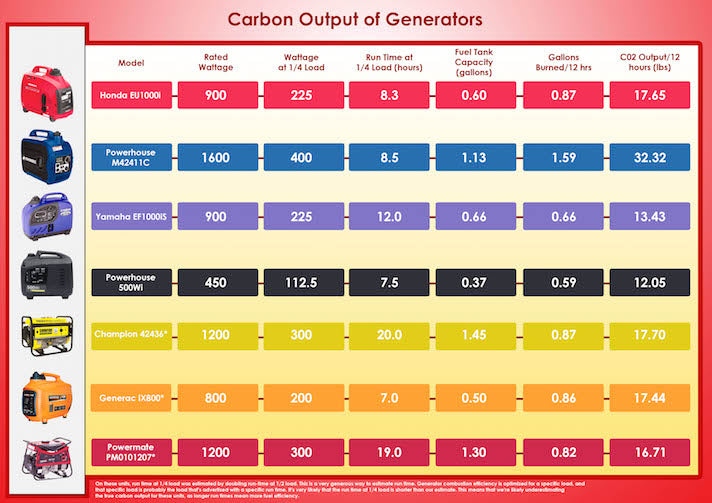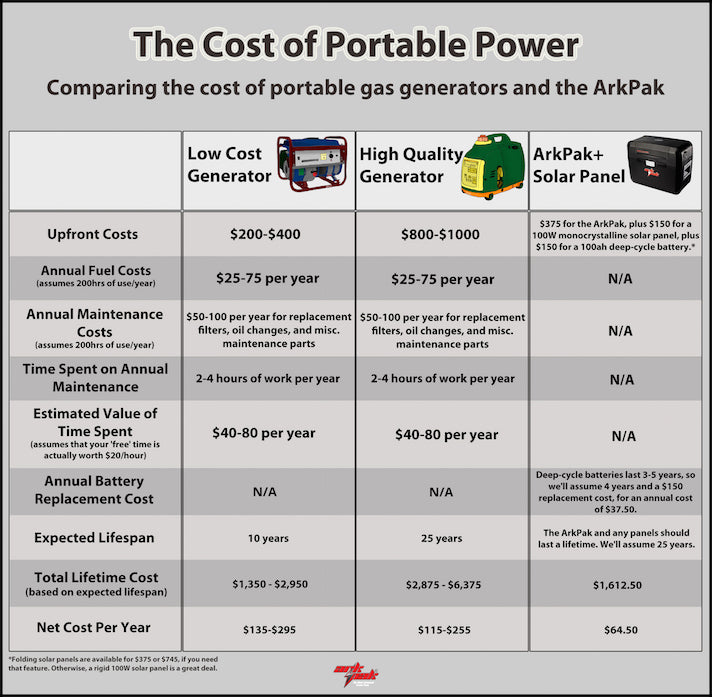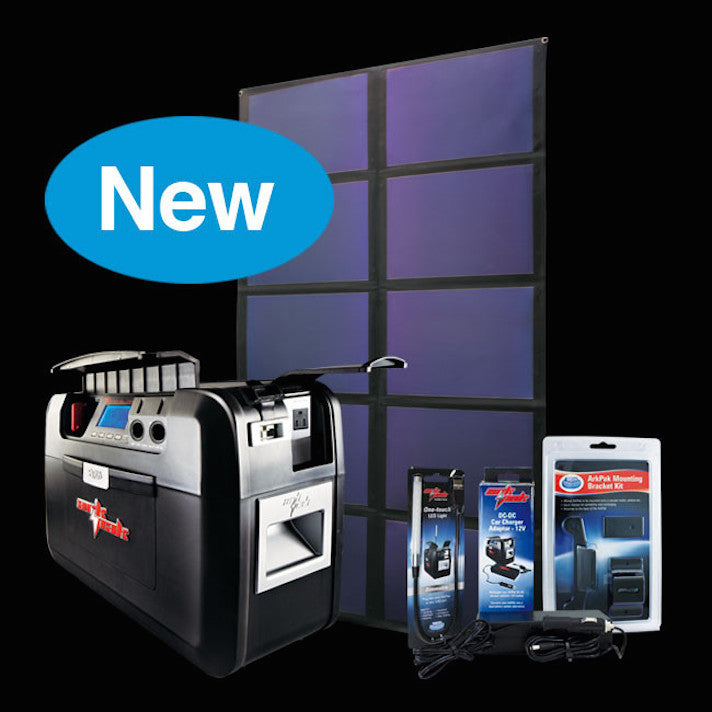Camping is a great way to get off the grid for a while, reconnect with nature, and take a breather. However, if you use a gas generator when you go camping to power your gear (say a portable fridge, some campsite lighting and small electronics), you're leaving behind a big carbon footprint.
In the chart below, the average camping generator pumps out 1-2 lbs of carbon dioxide per hour, even when running at only 1/4 of the max rated load.

Here's how and why we've put this gas generator carbon footprint guide together, as well as information on a green alternative to a gas generator.
How We Selected The Generators In Our Carbon Chart
The criteria for the selected generators are:
- They're all affordable (they range in price from $200 to $800, with most costing $500 or less)
- They're all portable (most units weigh 50lbs or less)
- They all produce about 200W of power at 1/4 load, which is enough to provide basic power to some standard camping accessories (more on that below)
We selected a variety of models - including some that produced more than 200W - to see how they all compared. We also tried to include popular models that were readily available for purchase online and that had good reviews. Finally, we estimated carbon output whenever an official 1/4 load run time wasn't available, using an estimation method that likely underestimates carbon output.
The bottom line: Each generator in our chart produces 1-2 lbs of carbon dioxide per hour operating at one quarter of their maximum rated load.
Why Do Campers Use Gas Generators?
Campers with generators tend to use some or all of the following devices when camping:
- Portable refrigerators, which can pull as little as 10W or as much as 100W depending on type and design.
- Campsite lighting, typically powered by LEDs that will use 5 to 50W of power.
- A smaller LED television or laptop, used for watching movies and requiring 20 to 80W of power.
- A fan inside a tent or camper, which can draw 75 to 300W (depending on size and efficiency).
- Cell phones and tablets, which typically 2W to15W when charging.
There are also campers who need portable power for CPAP machines, which usually require less than 100W of power (assuming the heater and humidifier are off). 200W of electrical power is enough to power most of these devices at the same time.
Often times, campers choose a gas-powered generator to meet their power needs. We believe the ArkPak is a viable alternative, especially for campers who don't need a lot of electrical power.
How Does A Gas Generator’s Carbon Footprint Compare?
If we assume that a gas generator used for camping produces 1.5lbs of CO2 per hour of use and that most campers are running their generators at least 10hrs per day (either to keep a fridge cool during the daytime or to power a fan and lights at night), we can make some comparisons:
- Frequent campers with gas generators who go camping 2-3 times a month (and who stay 2-3 nights) will produce 563lbs of carbon dioxide over six months. That's the same amount of weight as 1,200 empty beer bottles left behind in the wilderness.
- Less frequent campers with gas generators who may only go camping a couple of times per season, but who spend 3-4 days camping, leave over 100lbs of carbon dioxide behind each year. That's about 40 six-packs worth of empty beer bottles.
- People who live in a small cabin or tent for extended periods and use a generator daily will produce over 100lbs of carbon dioxide a week, assuming they only run their generators at night. If they run the generators 24/7, that number leaps to 250lbs of CO2 a week. That's about 100 six-packs of empty glass beer bottles a week.
NOTE: According to FuelEconomy.gov, each gallon of gasoline contains 20.35lbs of carbon dioxide.
Finally, we should mention that gas generators don't just produce carbon dioxide. They also produce substantial quantities of carbon monoxide, nitrous oxides, and sulfur oxides, all of which are toxic. If they’re inhaled they can cause sickness or even death - gas generators are estimated to cause about 50 deaths each year. To be fair, most of these deaths occur in fixed structures rather than during camping.
Still, carbon monoxide, nitrous oxides and sulfur oxides are all discharged by gas-powered generators, and they're also bad for the Earth (not to mention people at the campsite).
Alternatives To Portable Gas Generators For Campers
If you're seeing all the facts and figures about gas generator pollution and wondering about alternatives, let us present the ArkPak 715 60W solar bundle:
With a 100ah deep-cycle battery installed in the ArkPak, the 60W solar panel can store 25-40 amp hours of power each day - depending on sun exposure time and quality. If the ArkPak is used to power an energy efficient portable fridge, camping fan, and to charge a few electronic devices daily, the combination of daily solar charging and power reserves can provide a campsite with power for days. If a second solar panel is used (120W total), the ArkPak can provide power for all the accessories mentioned for weeks, or perhaps even indefinitely (depending on your specific usage and weather patterns).
Some other advantages to using an ArkPak instead of a gas generator:
- You don’t need gasoline cans, and you don’t need to worry about refueling
- You’re not exposed to poisonous exhaust fumes or gases
- No constant noise
- Unlike generators, an ArkPak has no periodic maintenance or annual servicing requirements
- Neither the ArkPak nor the solar panels have any moving parts – reliability is on another level
Obviously, we're a bit biased towards the ArkPak here on the ArkPortablePower.com blog. But our bias doesn't change the fact that generators require a lot of work to own and maintain, nor does it change the fact that generators can be smelly and loud.
How Cost-Effective is a Portable Gas Generator Compared To An ArkPak With A Solar Panel?
A lot of people opt for a gas generator because they're affordable (or at least seem to be). The lowest cost generator in our comparison (the Champion 42436) is about $200, which makes it an affordable device compared to the 60W ArkPak 730 Solar Bundle (especially after a deep-cycle battery is purchased and installed).
However:
Small gas engines are generally rated to last only 2,000 hours. Some - like Honda or Yamaha brand generators - will last much longer (Honda generators have run as long as 10,000 hours), which is part of the reason they cost nearly $1,000 instead of just $200. But if you're a frequent camper, you might be replacing a “cheap” generator every 2-4 years.
Small gas engines require considerable maintenance. Oil changes (new oil and sometimes a new filter) are needed every 50-100 hours or once per year, regardless of hours used. If you only turn on your generator ever couple of weeks for 20 minutes (see below), you're still going to have to do an oil change. Additionally, generators require a careful cleaning and inspection every 50-100 hours or once per year. This cleaning and inspection process usually involves cleaning air and fuel filters, checking spark plugs, checking valve timing (on some models), and some other miscellaneous work.
Conservatively, you'll spend an hour or two maintaining your portable gas generator every year or every 50 hours of use, and you'll spend a few dollars on oil and perhaps filters, a new spark plug, etc. every time you do maintenance.
Small gas engines have to be turned on regularly. Most generator manufacturers suggest starting and running a generator every 2 weeks for about 20 minutes. That's more of your time that goes to generator maintenance.
Small gas engines burn gasoline, which isn't free. If you have a generator that only burns 2 gallons of gas for every 50 hours of use, fuel expenses might seem very small. But when you start to figure out the lifetime cost of fuel, a generator that runs 2,000 hours will burn 80+ gallons of gas in it's life span. That's hundreds of dollars worth of fuel.
Adding it all up – the relatively short lifespan, the time and money associated with near-constant maintenance, and the cost of fuel, and a “cheap” generator is actually quite expensive.

The chart above* breaks down the relative costs of a low-cost generator, a high cost generator, and an ArkPak with a solar panels. While the chart might be a little too pessimistic on the high end of our cost estimates, we were very aggressive on the low end of our estimates.
The point: even a "cheap" gas generator costs twice as much as the ArkPak, at least on a lifetime basis.
Simply stated, the cost of an ArkPak ($375), a deep-cycle battery ($100-$200) and a solar panel of some kind (either a folding panel like the type we sell or a rigid flat panel for $100-$150) are very affordable...at least compared to the cost of a generator after you account for the lifetime ownership and maintenance costs.
Conclusion - Gas Generators Probably Aren't The Best Choice For Campers With Light Power Needs
Portable gas generators definitely have their value. They can provide considerable quantities of electrical power at a relatively low cost. In an emergency, portable gas generators are often a godsend. And there are some environments (like a large camp site, a construction site, or a big public event) where a portable gas generator is the obvious choice.
But when it comes to recreational camping, electrical power requirements are usually pretty low, and energy efficient portable fridges, lighting, and fas are all readily available. In this environment, a gas-powered generator is probably overkill. The ArkPak can provide enough power to run a typical campsite for a day or two, and longer (perhaps indefinitely) when paired with the right solar panel.
Finally, the economics of portable gas generators – especially “cheap” generators - aren't as positive as they seem at first glance. By the time you account for annual maintenance costs, time spent performing maintenance, and fuel costs, the ArkPak and solar panel combo is surprisingly affordable.
Unless you need the high wattage of a portable gas generator, it says here that you should consider an ArkPak.
*Specs and prices on newer versions vary. Check them out here.

